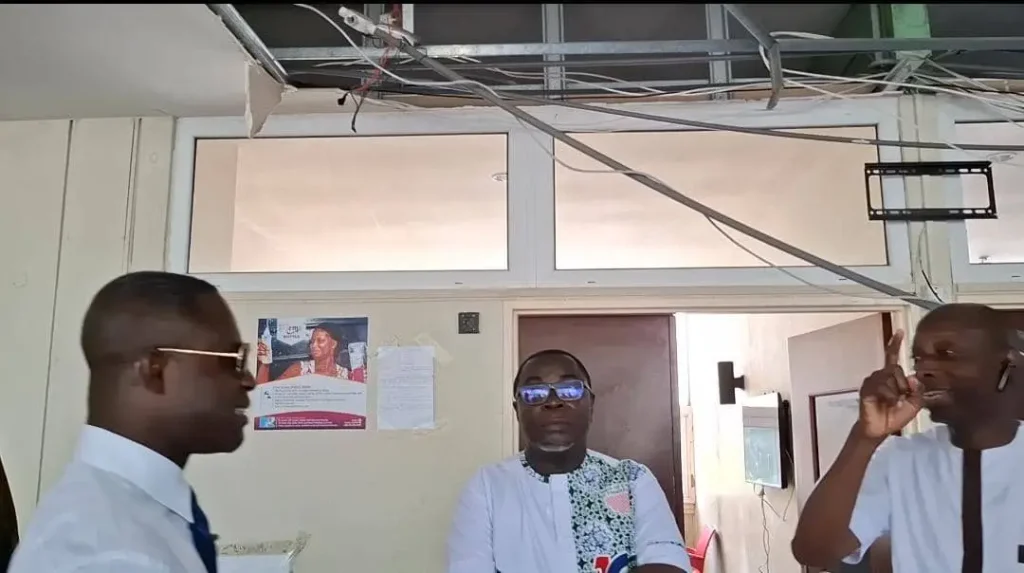The Minister of Health, Kwabena Mintah Akandoh, recently conducted an inspection of the Korle-Bu Teaching Hospital, Ghana’s premier referral center, following a surge of public outcry concerning the hospital’s decaying infrastructure. The Minister’s visit, on May 14th, focused primarily on the Maternity and Surgical blocks, areas that had been highlighted in reports detailing the subpar conditions. His tour encompassed wards, washrooms, and malfunctioning elevators, each revealing a troubling lack of upkeep and maintenance. The Minister expressed his deep concern over the state of disrepair, emphasizing the urgent need for immediate action to rectify the situation and ensure patient safety. He stressed the importance of a fundamental shift in the maintenance culture within the country’s healthcare system, advocating for a proactive approach to upkeep rather than reactive interventions.
The Minister’s concerns stem from a growing awareness of the deteriorating conditions at Korle-Bu, a situation that has been subject to increasing public scrutiny. The dilapidation extends beyond cosmetic issues, impacting crucial aspects of the hospital’s functionality, hindering patient care, and potentially jeopardizing patient well-being. The non-functional elevators, for instance, not only inconvenience patients and staff but also pose a serious obstacle in emergency situations, where timely access to different departments is critical. Similarly, the poor state of wards and washrooms raises serious hygiene concerns, increasing the risk of infections and complicating patient recovery.
The Minister’s inspection revealed a pattern of neglect, suggesting a systemic failure to prioritize regular maintenance within the hospital’s operational framework. This neglect has allowed minor issues to escalate into significant problems, potentially compromising the hospital’s ability to deliver quality healthcare. The Minister’s call for a change in the maintenance culture underscores the need for a paradigm shift, moving away from a reactive approach to maintenance, where repairs are undertaken only after problems arise, to a proactive strategy, where regular upkeep and preventative maintenance are prioritized.
The management of Korle-Bu Teaching Hospital responded to the Minister’s concerns by assuring him that an emergency meeting would be convened to address the identified issues. This meeting signifies an acknowledgment of the gravity of the situation and a commitment to finding solutions. However, the true measure of the hospital’s commitment will be the concrete actions taken in the aftermath of the meeting. A comprehensive plan of action is required, encompassing not only immediate repairs but also long-term strategies to ensure consistent maintenance and prevent a recurrence of these issues.
Addressing the infrastructure challenges at Korle-Bu requires a multi-faceted approach. Immediate repairs are essential to address the most pressing issues and ensure patient safety. This may involve replacing or repairing malfunctioning equipment, renovating dilapidated areas, and enhancing hygiene standards. However, beyond immediate fixes, a long-term maintenance plan is crucial. This plan should include regular inspections, preventative maintenance schedules, and a dedicated budget for upkeep. Additionally, accountability mechanisms must be established to ensure that maintenance tasks are carried out effectively and consistently.
Furthermore, the problems at Korle-Bu highlight the need for a broader review of maintenance practices across Ghana’s healthcare system. A systemic approach is required to ensure that all healthcare facilities are adequately maintained, preventing similar issues from arising in other hospitals. This could involve developing national guidelines for hospital maintenance, implementing standardized protocols, and providing training and resources to facility managers. By prioritizing a culture of preventative maintenance, Ghana can ensure the long-term viability of its healthcare infrastructure and provide quality care to its citizens.














